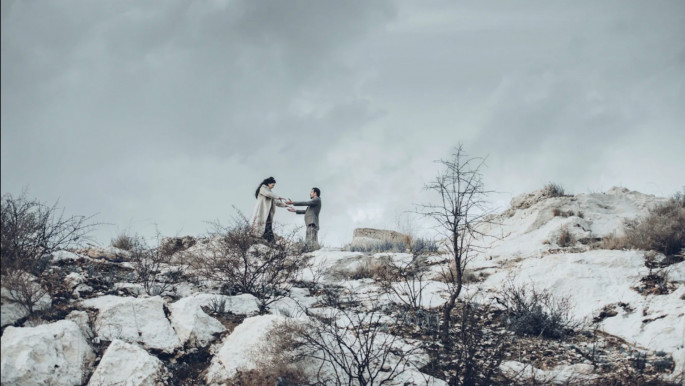Yo-Yo Ma's Silkroad releases Syria 'soundscape' to mark 10th anniversary of revolution
Entitled "'I wish it had been a dream': Voices from Syria", the four-minute "soundscape" by Silkroad and the UNOCHA combines music from Syrian clarinetist Kinan Azmeh with the accounts of 100 different Syrians.
Azmeh is a member of the Silkroad Ensemble, a loose international musical collective founded by Ma.
The music and voices are accompanied by illustrations depicting the devastating conflict and the lives of the millions of Syrians who sought refuge outside the country.
"We never thought that we would reach this point. We thought the crisis would last a day or two," a woman says at the beginning of the video against the backdrop of a crumbling Syrian neighbourhood.
Other voices chime in alongside Azmeh's melancholy composition.
"Honestly, I wish this had been a dream," says one person.
Others describe the sudden loss of their husbands or brothers.
"The shelling was right and left. It was 6am in the morning, we fled and we were all crying, there was sniper fire above our heads," one man describes.
A child's voice enters the composition: "I have spent my entire life in displacement.
"I go to a new school ever year, make new friends, and then get displaced again."
Others go on to describe their lives in exile, what has kept them going over the past ten years, and their thoughts about the future.
The video finishes with a young boy's voice.
"I hope that we will return to our homes and live a more beautiful life," he says.
The "soundscape" is accompanied by a photo essay compiled by more than a dozen Syrian photographers.
The photographers provided their own hand-written captions.
"We left and did not arrive yet; we have no destination," writes Mohammed Badra, discussing his displacement.
"The forced migrant has nothing but a compass that always points towards the back and a map that only indicates the destination he left by force."
 |
|
"I had not looked at the sky in the darkness of the night for a whole decade; on a night in the summer of last year, I was surprised by the sight of the stars over the destruction and the camps. The scene divided the world in half in front of my eyes; a half shows what was made by the hand of God, and the other half shows what was made by the hand of man. A moment that reminded me of when I was a child, and I used to sleep under the sky on our home roof. In the photo, this man sleeps in the safety of the stars, God's creation, to escape the heat and suffering of the tents that men made." - Omar Haj Kadour [Photo: Omar Haj Kadour/AFP] |
Others describe how they transformed from high school students and primary school teachers into photographers, and question whether a photograph can end a war.
"Despite the trauma, I tried to document the destruction by collecting the contradictions of life, and by documenting the destruction with beautiful pictures that contain our pain," writes Aboud Hamam.
 |
| "During more than 10 years of my work in the field of photography, most of which coincided with the Syrian crisis, I have always tried to document moments that inspire hope and optimism and not the opposite.
I love photographing people, their faces and eyes, the details of their daily lives, and telling their stories through my pictures. I always look for the positive image in someone's story because I believe that hope is always present." - Ashraf Zeinah [Photo: Ashraf Zeinah] |
Follow us on Facebook, Twitter and Instagram to stay connected





 Follow the Middle East's top stories in English at The New Arab on Google News
Follow the Middle East's top stories in English at The New Arab on Google News


